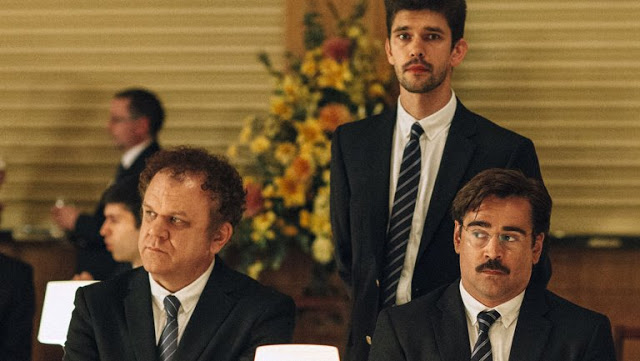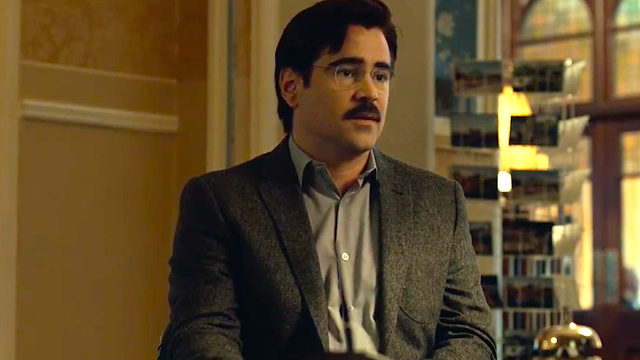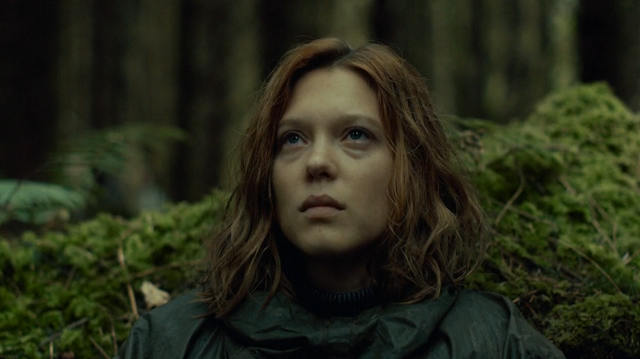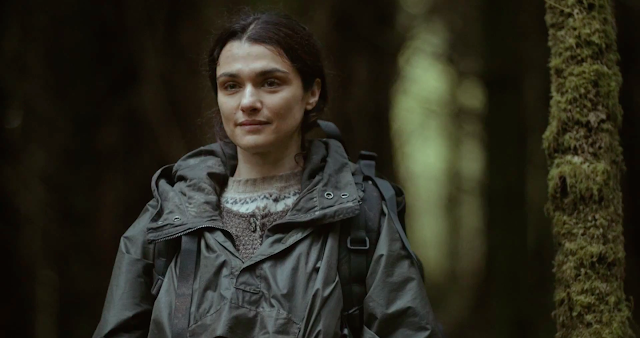Early in The Lobster, the deadpan, depraved, deeply romantic black comedy from Yorgos Lanthimos, a woman discusses the unsuitable hypothetical couplings of various animals. She notes, for example, that a wolf and a penguin could never live in harmony. “That would be absurd,” she scoffs. Fair enough. But when it comes to Lanthimos, absurdity is relative. The Greek director’s prior film, Alps, followed a four-person troupe of bizarre ambulance-chasers who waited for people to die, then impersonated the deceased for the bereaved’s benefit (in return for a fee). Before that he made Dogtooth, a nightmarish study of three home-schooled teenagers who had no names, learned a false language, and regarded house cats as ferocious beasts to be decapitated on sight. Dogtooth was consistently fascinating, Alps intermittently so, but both depicted their human grotesqueries so persuasively that they were easier to admire than adore. The Lobster is different, even as it’s more of the same. It retains the hypnotic surrealism of Lanthimos’ earlier work, but it also possesses something even more startling: a heart.
All of Lanthimos’ films operate on multiple levels, working as tidy, intimately scaled pieces of off-kilter esoterica while also asking big, loaded questions about social customs and human relationships. Here, he’s exploring the freighted topic of love. That’s hardly a novel hook for a movie, but The Lobster is less interested in defining love than in examining how we view it as a symbol of status. And so it inquires: Are married people truly happy? Are single people really alone? When we claim that we are in love, what do we mean? Is coupledom a shield against the sadness of isolation, or is it a prison that suppresses freedom and individuality? And if you get caught masturbating, shouldn’t you be forced to stick your hand in a burning-hot toaster?
Sorry, I got ahead of myself. But one of the impressive things about The Lobster is how thoroughly it commits to its eccentric flourishes, treating them as matter-of-fact realities rather than winking satirical constructs. It is in a sense a fantasy film, and its dedication to world-building is as meticulous as any superhero extravaganza or science-fiction epic. It takes place in a dystopian universe where citizens are required by law to live happily with a partner. Singles, labeled “loners”, are outcasts who subsist in the woods, while police officers prowl urban shopping malls, demanding to see “papers” for anyone unaccompanied by a mate. This creates a problem for David (Colin Farrell, superbly restrained), whose wife has just left him for another man and who must check into a very particular hotel operated by a polite, fastidious manager (Olivia Colman, fresh off her spy-tinged gallivanting in The Night Manager). She informs David that he has 45 days to fall in love with a female guest (the bisexual option has been discontinued, sorry for the inconvenience); if he fails to do so, he will be transformed into an animal of his choice. He’s familiar with this twist on Beauty and the Beast—the dog who loyally trots after him is actually his brother, who failed to find love as a man two years earlier.
As I said: absurd. But to fixate on The Lobster‘s delicious weirdness is to risk overlooking both its formal beauty and its thematic resonance. Narrated in a flat, intentionally mechanical monotone by Rachel Weisz, it tracks David’s hotel sojourn with anthropological detachment, which feeds gracefully into Lanthimos’ crisp, clinical style. For someone whose films are so outlandish, he is remarkably assured with the camera, favoring long takes and elegant compositions. His visual discipline both punctures and accentuates the strangeness of his subject matter, and it also elevates his deadpan approach to comedy. (As a sampling of the film’s black humor, couples who find themselves struggling are assigned children—”it usually helps.”) The Lobster is often hilarious, largely because it rarely feels like it’s trying to be funny.
Certainly the ticking-clock mandate to fall in love is no laughing matter to David, nor to the other guests he meets, each of whom possesses a “defining characteristic”. He befriends Lisping Man (John C. Reilly, in maximum pathetic mode) and Limping Man (Ben Whishaw), the latter of whom sets his eyes on Nosebleed Woman (Jessica Barden, currently slashing throats on Penny Dreadful). Together they bear witness to the hotel’s curious rituals, such as didactic pantomimes—one involving a mugging, another the Heimlich maneuver—designed to underscore the indispensability of partnership and the perils of solitude. There is also a daily journey to a nearby forest, where residents are armed with tranquilizer guns, the purpose of which is best left unspecified. And while masturbation is prohibited (remember that toaster? Lisping Man does), the staff still check in on the guests’ virility, a routine that transforms the typical fantasy of fucking a maid into an excruciating case of blue balls.
“That’s awful,” David complains after one such session with the maid. It’s hard to disagree, though it is also hard not to smile at Farrell’s soft-spoken, tender performance. Wearing weak glasses, a strong mustache, and a paunch, he relinquishes all vestiges of vanity, and he proves an invaluable anchor of restraint amid a roiling ocean of farce.
Yet while The Lobster would be appealing for its sheer whimsy alone, Lanthimos isn’t just making a kooky movie about emotional and sexual frustration. He seeks to expose society’s unwritten codes and judgments, and to investigate how institutions habitually oppress individuals. The manager may be unfailingly courteous, and she behaves as though she’s providing a public service in helping people grow closer together, but she remains merciless in enforcing the hotel’s inflexible standards of conduct. Such rigidity, combined with the mounting fear of being transformed into a crustacean, inevitably drives David to fakery; he ultimately elects to pursue Heartless Woman (Lanthimos regular Angeliki Papoulia), and the manner in which he demonstrates his false affection toward her is sublimely callous. (To be fair, it is far less dramatic and painful than Limping Man, who intentionally smashes his head into a table to draw blood, the better to appear compatible with Nosebleed Woman.) But on a deeper level, David’s resort to duplicity illustrates how people will subjugate their true selves to survive in the face of a totalitarian regime.
This inherent conflict—between compliance and freedom, between the ruling and the ruled—achieves even greater force once circumstances conspire to make David escape the hotel and join the loners. They are led by a brusque, unsmiling woman (Blue Is the Warmest Color‘s Léa Seydoux, wonderful) who assures David that he is now free, and it would be easy for Lanthimos to paint the loners as proud anarchists, chafing against society’s senseless strictures. Yet as David soon learns, the loners have their own insidious agenda, as well as their own unbending laws: They are as forbidding of romantic attachment as the city-dwellers are of isolation. And once again, David finds himself clashing with his society’s values, as he grows attracted to a fellow loner (Weisz, now in the flesh), a bright-eyed woman who hunts rabbit and who shares David’s defining characteristic of being shortsighted.
Eventually, The Lobster transitions into something even weirder and more beautiful: a love story, one that is both bitterly cynical and heedlessly romantic. It conceives of a world where romance is a function of obligation rather than a source of true happiness, which makes the blossoming affection between David and Shortsighted Woman all the more joyous. But can they really find bliss when such a union is anathema to the loners’ culture of aloofness?
The resolution to that question is surprisingly suspenseful—as with Dogtooth, Lanthimos concludes The Lobster with an agonizing cliffhanger—but it also scarcely matters. The journey here is too glorious to fret over the destination. To watch this movie is to recognize the power of Lanthimos’ own defining characteristic: the ability to make cool, calculated films that nevertheless provoke emotion and inspire thought. Here, he has finally connected his head with his heart, and even as you appreciate his craft and his intellect, you will surrender to the breadth and ambition of his vision. The Lobster may paint a quietly terrifying portrait of a bleak alternative universe, but it’s ultimately an uplifting experience. Besides, even if its dark fantasies become reality, I’m not worried. You see, I’ve already found someone. It’s a movie called The Lobster. We may have just met, but we’re very much in love.
Grade: A
Jeremy Beck is the editor-in-chief of MovieManifesto. He watches more movies and television than he probably should.





